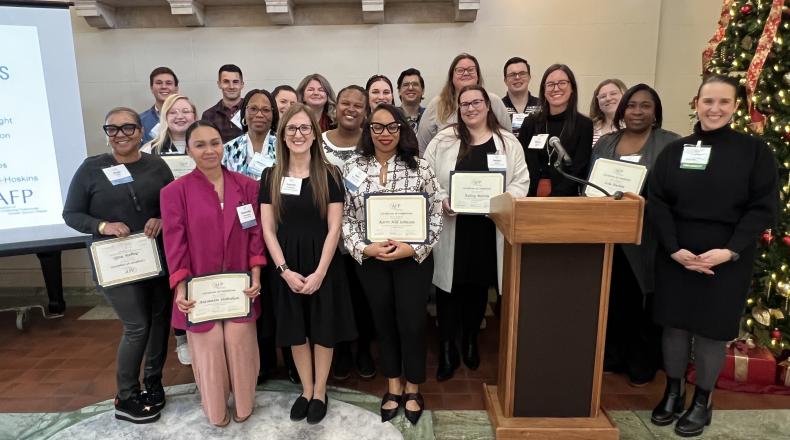AFP Chapter Spotlight: AFP Greater Detroit Chapter Mentoring Program

The AFP Greater Detroit Chapter has more than 300 members from seven counties in southeast Michigan. For this chapter spotlight, we asked them to share with us how they’ve partnered with a local foundation to offer a mentoring program to new fundraisers, which provides the participants with a mentor and one year of complimentary access to the resources and education that AFP membership provides. Download the Chapter Spotlight: Share & Reapply Form to see key takeaways that you can use to launch your own fellowship program.
Q: What was the objective or primary goal of starting your mentorship program?
A: The Marjorie S. Fisher Fellowship, operated by AFP’s Greater Detroit Chapter, is renowned across the U.S. as a leading mentorship program for new development professionals. The objectives of this program are to allow new professionals to network with their more experienced peers and learn from experts on various topics relevant to the industry. Our overall goal is to ensure a pipeline of qualified professionals in the development field who share the same collective values as our chapter.
Q: How did your mentorship program get started?
A: Our chapter established a relationship with the Max and Marjorie Fisher Foundation, a local foundation whose executive director had a background in fundraising. They approached us with an interest in mentoring fundraisers who were new to the profession in the city of Detroit, with the goal of providing them support and hopefully keeping them in the fundraising field. The foundation had asked our chapter what the impediments were to joining AFP, and the two major ones were time away from work, and financially paying for dues. Together, we created the Marjorie M. Fisher Fellowship which, thanks to the generous support of the foundation, paid for the dues of each fellow in the program. Our chapter added monthly workshops to accompany the mentorship and later added networking opportunities as well, at the request of the fellows.
Q: What were some key strategies that you employed to achieve your goals for the program?
A: One major key was for the fellows to be held accountable for arranging the mentorship meetings and attending the monthly programs. We have found that those who are most engaged benefit from the program more than others. Another key strategy was finding ways to engage the fellows outside of the program, so they are exposed to all facets of AFP.
Q: Do you have any advice for chapters looking for sponsors/partners for their mentorship program?
A: We believe that we received the support of the foundation because the executive director was a former fundraiser and understood the challenges that we face in this profession. He also works for a foundation that understands the benefit of engaging with fundraisers and, over the years, saw the value. It is important to provide updates and show impact just as you would with any other donor. When we visited with the foundation early on, we communicated that a consistent struggle is some fellows do not renew their membership after being a part of the cohort. We still struggle with this to this day, and we find that the more involvement they have with AFP outside of the program, the likelier they are to renew their membership. It is important to find partners that support the work we do and align with our respective missions. It is also important to share with potential funders the real barriers fundraisers face, and the impact that education and support can provide.
Q: Can you share any lessons learned from building and growing your mentorship program?
A: There are many lessons learned and advice to share! As a chapter, it is absolutely critical that you engage these fellows for the long term as they are prime candidates to become mentors in the following years. Having opportunities to volunteer for events, sit on committees, and have a voice regarding programming, will go a long way toward retention. There always seems to be a high number of fellows, and never enough mentors, so it is important to ask them for feedback on the program and truly find out what is working and what isn’t. It is also important to be aware of trends in philanthropy and really assess what your applicants desire to learn about. We use a rating system on our applications with various educational options and tailor our programming to fit their needs. It is also important to plan early in the year! We have found that by having 95% of our year planned by the end of March really helps with keeping the program running smoothly.
Additionally, it is important to establish the guidelines you will be using for the program (for both the fellow and mentor). What educational programming will you offer? How frequently and in what format? In what ways will you engage the fellows for long-term success?
Q: What has been the impact or results of your mentorship program?
A: The program has graduated over 150 Fisher Fellows since 2017. 2024 is slated for more growth, including adding an additional educational session, changing some of the topics covered, and adding more networking options. There is continued demand for an advanced mentorship program (3+ years in the field) that we are in the process of implementing for 2025. Many fellows have gone on to become mentors, committee leaders, and board members of our chapter. Mentors who participate report feeling fulfilled and enjoyment from mentoring someone with a fresh set of eyes. Priority acceptance is given to development professionals working in small-budget nonprofits; data has shown there is a severe barrier to accessing membership from smaller organizations. By providing fellows with a paid membership, they can access all of AFP’s programming and resources as well as the chapter-wide offerings. This increases our engagement with our community and provides more access to those working in these underfunded areas of fundraising.